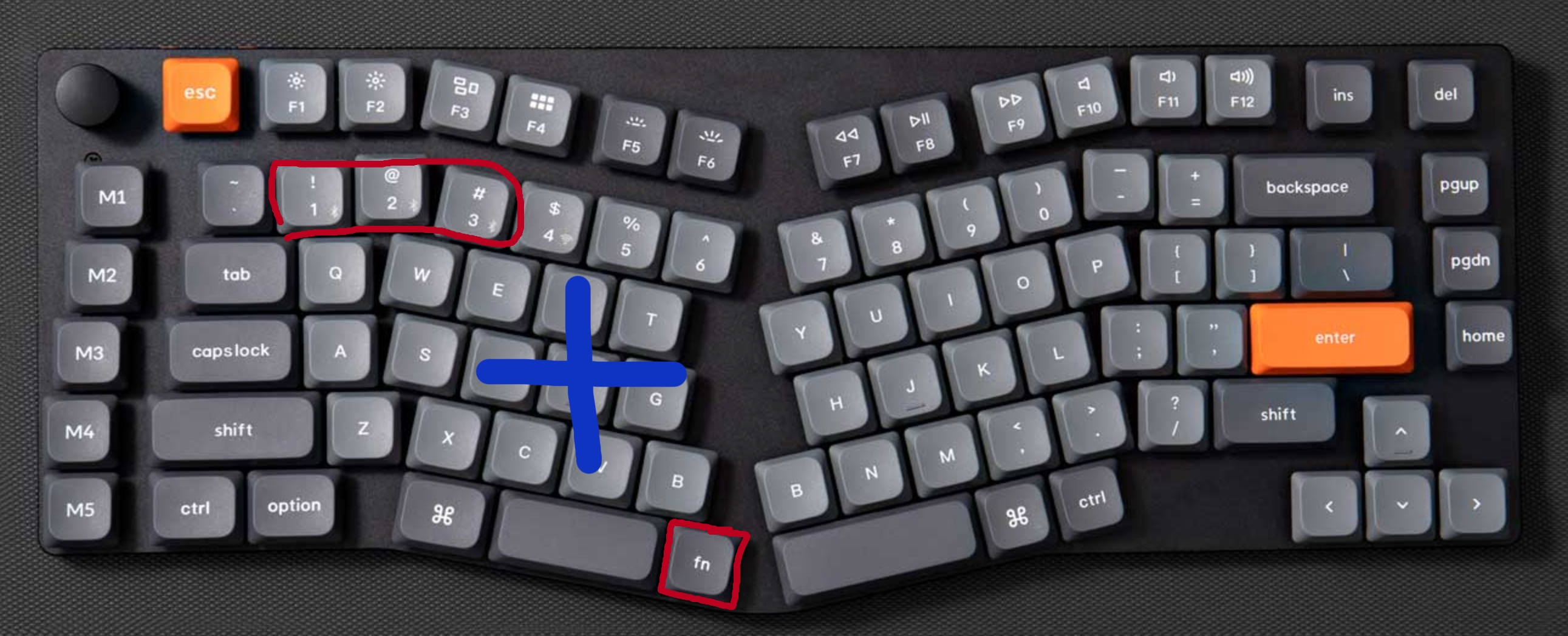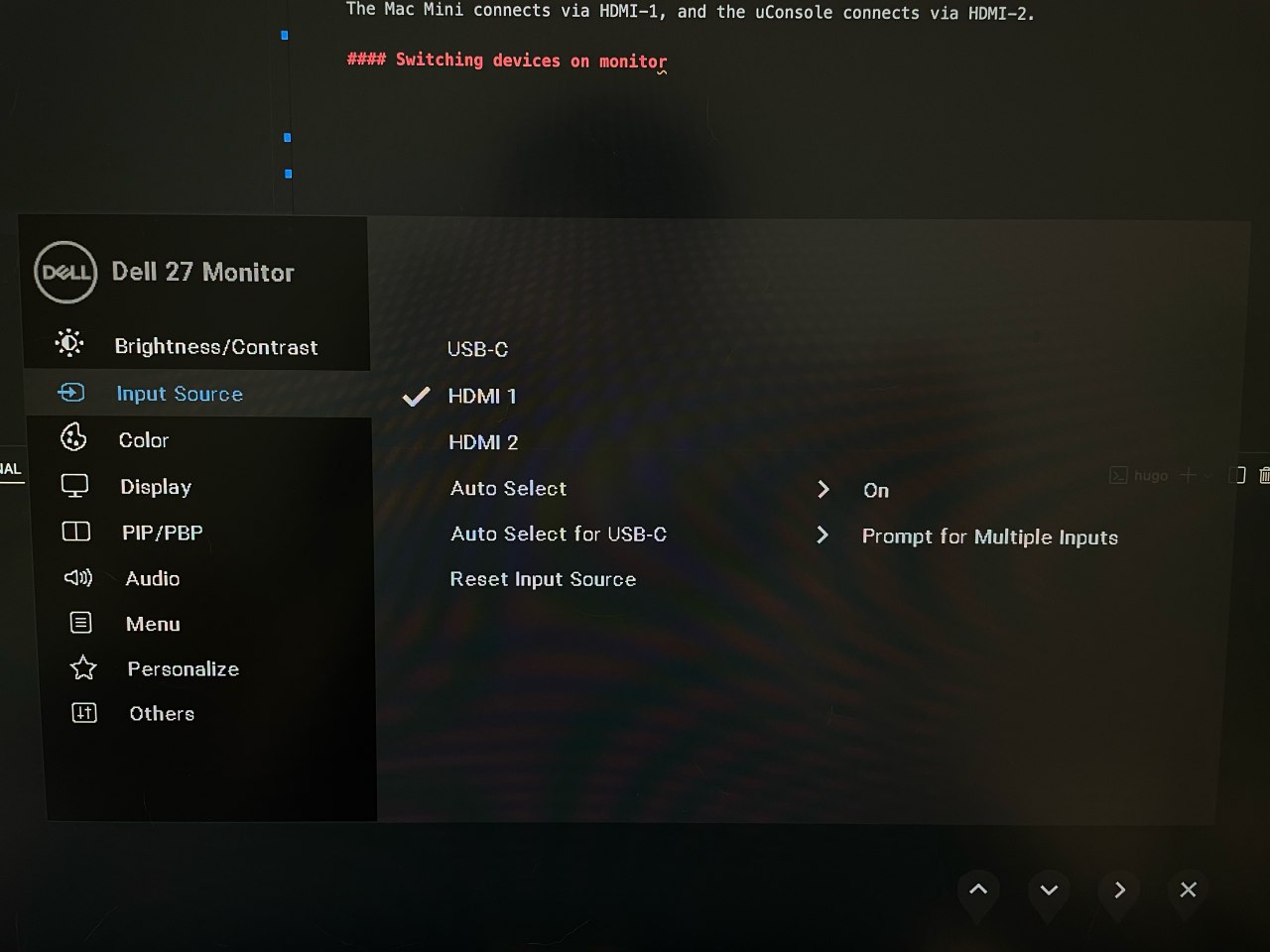Hi there! Today, I want to share how I organize my three-computer setup (MacBook Air, Mac mini, and Raspberry Pi) without a KVM switch, using a single keyboard, mouse, and monitor.
My devices
Computers
- Macbook Air M2 14" – work Laptop.
- Mac Mini M1 – my personal computer.
- ClockworkPi uConsole, based on RPI CM4 is a portable device for Linux tinkering.
Peripheral devices
- The UGREEN Vertical Wireless - can connect up to three devices: Two via Bluetooth and one via a 2.4GHz USB dongle.
- The Keychrone K15 Max allows me to connect up to three devices via Bluetooth.
- The Monitor Dell 27 4K UHD con USB-C (S2722QC) with two HDMI inputs and one USB-C port which allows me to connect it up to three devices.
As you can see, all peripheral devices could connect to all my computers. At least in theory.
Connecting devices
Historically my devices were numbered as follows:
- uConsole
- Macbook Air
- Mac Mini
Keyboard
The keyboard connection scheme is straightforward: uConsole connects via Bluetooth to the first device, the MacBook Air, as the second device, and the Mac Mini as the third device.
Later, I can use the Fn + 1/2/3 hotkey to switch the keyboard between devices.

Mouse
The first connection of the Ugreen mouse is reserved for the 2.4 GHz USB dongle. I plugged it into my uConsole, and then my MacBook Air and Mac mini connected as the second and third devices, respectively.
To switch devices with the mouse, press the red button on the bottom.
Monitor
The MacBook Air is connected to the USB-C port, which charges the computer.
The Mac Mini connects via HDMI-1, and the uConsole connects via HDMI-2.
Easiest way to switch devices
The easiest way to switch devices on the monitor is to press the small, round button in the bottom right corner to open the settings menu.

Then, choose the desired port.

However, “easiest” does not mean “most comfortable”. Changing the monitor’s input source this way requires pressing these small buttons several times. You also need to keep track of which devices are connected to HDMI-1 and HDMI-2.
The comfortable way to switch devices
Instead of pressing buttons on the monitor and navigating its menu, I could press a hotkey on my keyboard to trigger the monitor to change input sources via its API (Display Data Channel/Command Interface Standard (DDC/CI).).
I have explained in detail how one could do it on a Mac in my another post - Monitor input source control on Mac.
I won’t go into detail here. I’ll just say that on my Mac Mini and MacBook Air, I have configured the following:
Mac Mini (#3)
- On
CMD + F1triggers switch to uConsole - On
CMD + F2triggers switch to Macbook Air
Macbook Air (#2)
For uConsole Linux machine (#1) I used ddcutil and configured the following hotkeys:
Ctrl + F2triggers switch to Macbook AirCtrl + F3triggers switch to Mac Mini
Switch sequence
Once all the devices are connected and the hotkeys are configured, the following sequence of actions is needed to switch to device #N (where N is 1, 2, or 3):
- Switch the monitor input source by pressing
CMD + F#N. - Switch the keyboard device by pressing
Fn + #N. - Switch the mouse by pressing red button on the bottom of it until the indicator is under
#Nis blinking.
For example, let’s assume I am currently using my third device – Mac Mini, to switch to Macbook Air (#2) I do:
- Press
CMD + F2 - Press
Fn + 2 - Press red button on the bottom of the mouse until indicator under 2 is on.
Here is a demo video:
Pros and Cons
Pros
- I don’t need a special KVM switch to switch between devices.
- I use my keyboard to switch (for two-thirds of the KVM).
Cons
- Switching the mouse takes longer since there is only one way iteration over the connected devices.
- Three actions are needed to switch all peripheral devices, as opposed to one action with a KVM.
- I still need to manually reconnect other peripheral devices, e.g. web camera.
Final thoughts
It has some limitations, but if you have a keyboard and mouse that support multiple connected devices, as well as a monitor, you won’t need a special KVM switch to switch between computers.
Thank you for reading this!